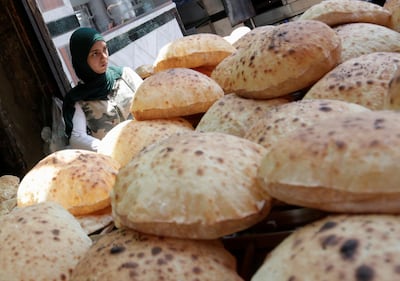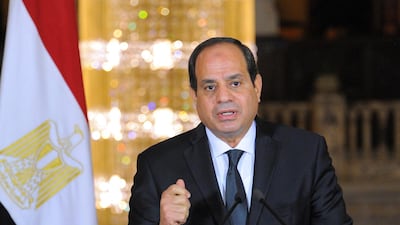Egyptian President Abdel Fattah El Sisi has made his case for increasing the price of bread, but says he has no intention of completely lifting the subsidies that keep basic food items affordable for about 70 million people.
Mr El Sisi first spoke about raising the price of bread on August 3, but he did not specify the extent of the planned increase.
His comments sparked debate on social media and in parts of the pro-government press about whether such a move was necessary given the economic hardship already endured by the country’s poor majority.
The price of bread has been a politically sensitive issue in Egypt for the past 50 years. Governments have made keeping the price low through costly subsidies – a flat loaf costs 0.05 Egyptian pounds ($0.0032) – a pillar of socio-economic policy.
A plan to lift bread subsidies in 1977 sparked days of deadly riots across the country. Successive governments have since found other ways to reduce the bread subsidies bill, such as reducing size of the loaf or suspending ration cards if their holders were found to be making enough money.
“Don’t be worried, we will not remove subsidies altogether, but will instead reorganise it,” Mr El Sisi said on Saturday during the inauguration of a housing project to the east of Cairo.
“I must reorganise the affairs of the country so it can be a nation of some weight.
I must reorganise the affairs of the country so it can be a nation of some weight
Egyptian President Abdel Fattah El Sisi
“I take the difficult path, not the easy one … some people say to me, ‘You’re doing fine and people love you, so why do this?' I say we are doing this to change our country, not so that people love us.”
Egypt spends about 275 billion pounds a year (roughly $15bn) on subsidies. About 70 billion pounds ($4.5bn) goes to bread alone, with each eligible person entitled to five flat loaves a day.
Meeting the demand for bread has made Egypt the world’s largest wheat importer, annually topping up its wheat production of nine million tonnes by importing about 12 million tonnes.
Mr El Sisi said subsidies amounted to about three trillion pounds over 10 years, while a three-year programme to improve the quality of life for about 50 million people in rural areas cost 800 billion pounds.
Since 2016, Mr El Sisi has introduced far-reaching reforms to overhaul the economy, battered by years of turmoil after a 2011 uprising.
The reforms include a partial lifting of subsidies on a variety of goods and services, including fuel, electricity and drinking water. New taxes have been introduced and the pound devalued.
The measures were praised by donors and international financial agencies, but added significantly to the hardships faced by many Egyptians. There have been protests against price increases.
The government, meanwhile, has gone to some lengths to cushion the poorest Egyptians from price increases triggered by the reforms.
It has also spent billions to tackle the shortage of cheap housing, building hundreds of thousands of apartments, including units given to residents of shanty towns demolished by authorities.
"In order to continue [doing this], we need to rearrange and recast the subsidies that we provide people with," Mr El Sisi said.
"I would rather we ate less but lived in decent housing units that meet minimum needs.
“I have spent 50 years studying all this and wonder to myself, 'How did the country get to be like that?' And [I think] that it must change and its people must live as they should.”
The biog
Favourite food: Tabbouleh, greek salad and sushi
Favourite TV show: That 70s Show
Favourite animal: Ferrets, they are smart, sensitive, playful and loving
Favourite holiday destination: Seychelles, my resolution for 2020 is to visit as many spiritual retreats and animal shelters across the world as I can
Name of first pet: Eddy, a Persian cat that showed up at our home
Favourite dog breed: I love them all - if I had to pick Yorkshire terrier for small dogs and St Bernard's for big
What the law says
Micro-retirement is not a recognised concept or employment status under Federal Decree Law No. 33 of 2021 on the Regulation of Labour Relations (as amended) (UAE Labour Law). As such, it reflects a voluntary work-life balance practice, rather than a recognised legal employment category, according to Dilini Loku, senior associate for law firm Gateley Middle East.
“Some companies may offer formal sabbatical policies or career break programmes; however, beyond such arrangements, there is no automatic right or statutory entitlement to extended breaks,” she explains.
“Any leave taken beyond statutory entitlements, such as annual leave, is typically regarded as unpaid leave in accordance with Article 33 of the UAE Labour Law. While employees may legally take unpaid leave, such requests are subject to the employer’s discretion and require approval.”
If an employee resigns to pursue micro-retirement, the employment contract is terminated, and the employer is under no legal obligation to rehire the employee in the future unless specific contractual agreements are in place (such as return-to-work arrangements), which are generally uncommon, Ms Loku adds.
The Greatest Royal Rumble card as it stands
The Greatest Royal Rumble card as it stands
50-man Royal Rumble - names entered so far include Braun Strowman, Daniel Bryan, Kurt Angle, Big Show, Kane, Chris Jericho, The New Day and Elias
Universal Championship Brock Lesnar (champion) v Roman Reigns in a steel cage match
WWE World Heavyweight ChampionshipAJ Styles (champion) v Shinsuke Nakamura
Intercontinental Championship Seth Rollins (champion) v The Miz v Finn Balor v Samoa Joe
United States Championship Jeff Hardy (champion) v Jinder Mahal
SmackDown Tag Team Championship The Bludgeon Brothers (champions) v The Usos
Raw Tag Team Championship (currently vacant) Cesaro and Sheamus v Matt Hardy and Bray Wyatt
Casket match The Undertaker v Chris Jericho
Singles match John Cena v Triple H
Cruiserweight Championship Cedric Alexander v tba
Tips to avoid getting scammed
1) Beware of cheques presented late on Thursday
2) Visit an RTA centre to change registration only after receiving payment
3) Be aware of people asking to test drive the car alone
4) Try not to close the sale at night
5) Don't be rushed into a sale
6) Call 901 if you see any suspicious behaviour
UK%20record%20temperature
%3Cp%3E38.7C%20(101.7F)%20set%20in%20Cambridge%20in%202019%3C%2Fp%3E%0A
Stage 2
1. Mathieu van der Poel (NED) Alpecin-Fenix 4:18:30
2. Tadej Pogacar (SLV) UAE Team Emirates 0:00:06
3. Primoz Roglic (SLV) Jumbo-Visma 0:00:06
4. Wilco Kelderman (NED) Bora-Hansgrohe 0:00:06
5. Julian Alaphilippe (FRA) Deceuninck-QuickStep 0:00:08
Founders: Abdulmajeed Alsukhan, Turki Bin Zarah and Abdulmohsen Albabtain.
Based: Riyadh
Offices: UAE, Vietnam and Germany
Founded: September, 2020
Number of employees: 70
Sector: FinTech, online payment solutions
Funding to date: $116m in two funding rounds
Investors: Checkout.com, Impact46, Vision Ventures, Wealth Well, Seedra, Khwarizmi, Hala Ventures, Nama Ventures and family offices
SANCTIONED
- Kirill Shamalov, Russia's youngest billionaire and previously married to Putin's daughter Katarina
- Petr Fradkov, head of recently sanctioned Promsvyazbank and son of former head of Russian Foreign Intelligence, the FSB.
- Denis Bortnikov, Deputy President of Russia's largest bank VTB. He is the son of Alexander Bortnikov, head of the FSB which was responsible for the poisoning of political activist Alexey Navalny in August 2020 with banned chemical agent novichok.
- Yury Slyusar, director of United Aircraft Corporation, a major aircraft manufacturer for the Russian military.
- Elena Aleksandrovna Georgieva, chair of the board of Novikombank, a state-owned defence conglomerate.
Fifa%20World%20Cup%20Qatar%202022%20
%3Cp%3E%3Cstrong%3EFirst%20match%3A%20%3C%2Fstrong%3ENovember%2020%0D%3Cbr%3E%3Cstrong%3EFinal%2016%20round%3A%20%3C%2Fstrong%3EDecember%203%20to%206%0D%3Cbr%3E%3Cstrong%3EQuarter-finals%3A%20%3C%2Fstrong%3EDecember%209%20and%2010%0D%3Cbr%3E%3Cstrong%3ESemi-finals%3A%20%3C%2Fstrong%3EDecember%2013%20and%2014%0D%3Cbr%3E%3Cstrong%3EFinal%3A%20%3C%2Fstrong%3EDecember%2018%3C%2Fp%3E%0A
Duminy's Test career in numbers
Tests 46; Runs 2,103; Best 166; Average 32.85; 100s 6; 50s 8; Wickets 42; Best 4-47
David Haye record
Total fights: 32
Wins: 28
Wins by KO: 26
Losses: 4
Sui Dhaaga: Made in India
Director: Sharat Katariya
Starring: Varun Dhawan, Anushka Sharma, Raghubir Yadav
3.5/5



